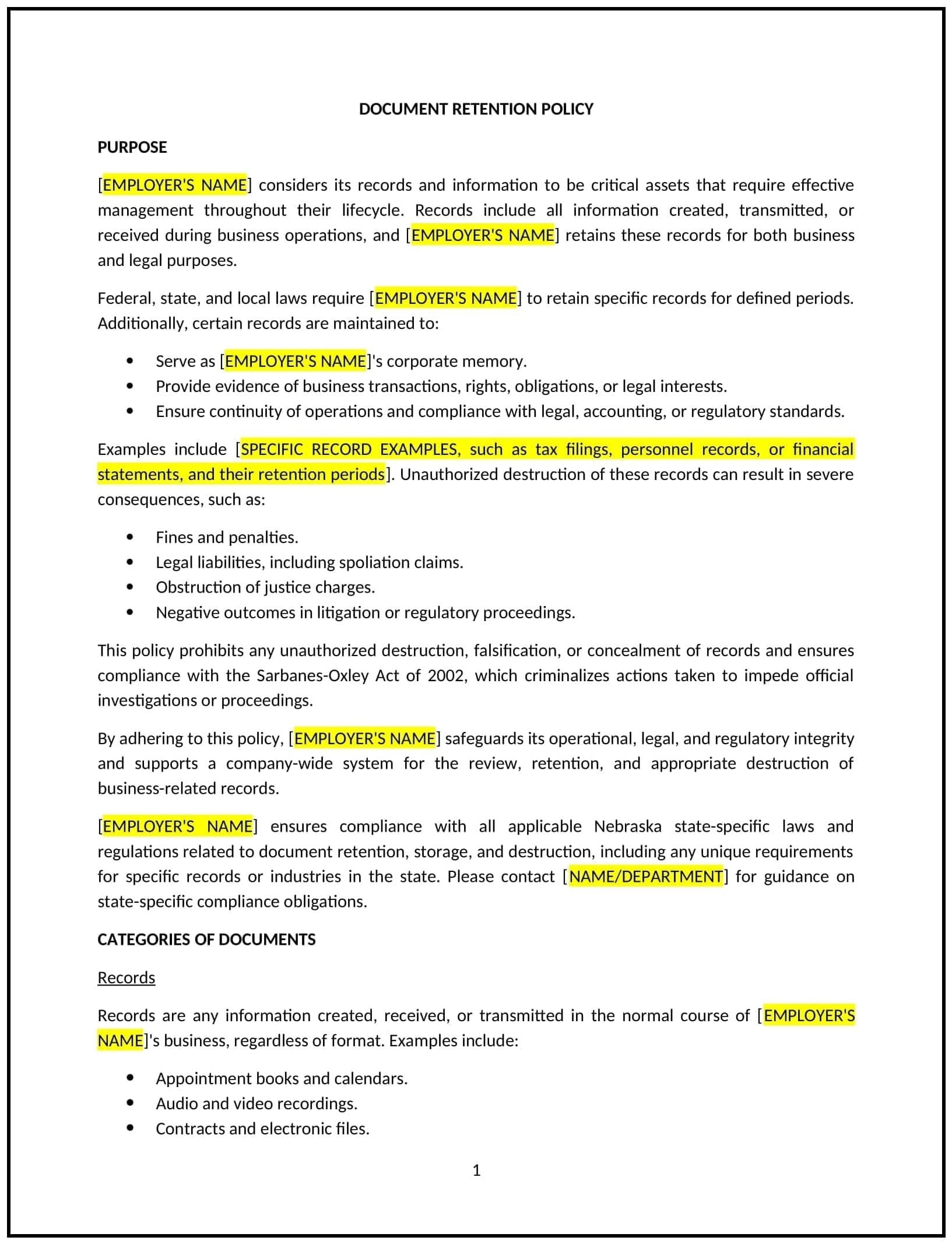Document retention policy (Nebraska): Free template
Got contracts to review? While you're here for policies, let Cobrief make contract review effortless—start your free review now.

Customize this template for free
Document retention policy (Nebraska)
A document retention policy helps Nebraska businesses establish guidelines for how long different types of business documents should be kept, how they should be stored, and when they should be destroyed. This policy applies to both physical and electronic documents and outlines the company’s approach to managing records throughout their lifecycle. It is designed to ensure that important documents are retained for the appropriate period, to minimize the risk of legal or regulatory issues, and to maintain efficient document management practices.
By adopting this policy, businesses in Nebraska can streamline document management, reduce clutter, and avoid potential legal liabilities associated with improper document retention or destruction.
How to use this document retention policy (Nebraska)
- Define document types: Clearly categorize documents that the business creates or receives, such as financial records, contracts, employee files, tax records, and legal documents. Specify the retention period for each type of document based on legal, regulatory, and business requirements.
- Set retention periods: Outline the required retention periods for each type of document, taking into account Nebraska state laws, federal regulations, and industry standards. Some documents may need to be kept for a few years, while others may need to be kept indefinitely.
- Specify storage methods: Define how documents should be stored, whether physically (e.g., in file cabinets) or electronically (e.g., in a secure cloud storage system). Ensure that documents are stored securely to prevent unauthorized access.
- Detail destruction procedures: Specify the process for securely destroying documents that have reached the end of their retention period, including shredding paper records and securely deleting electronic files. Ensure that destruction is done in a way that protects any confidential information.
- Address confidentiality: Emphasize the importance of protecting sensitive or confidential information throughout the document retention and destruction process, and ensure that employees are trained on how to handle such materials appropriately.
- Monitor compliance: Designate a person or team responsible for overseeing the document retention process, ensuring that the policy is followed, and that records are retained and destroyed according to the specified timelines.
- Review and update: Periodically review the document retention policy to ensure it remains aligned with changes in Nebraska laws, industry regulations, or business needs.
Benefits of using this document retention policy (Nebraska)
This policy provides several benefits for Nebraska businesses:
- Reduces legal risks: By following a consistent document retention schedule, businesses minimize the risk of keeping documents longer than necessary, which could lead to potential legal complications.
- Increases efficiency: A clear document retention policy helps businesses streamline document storage, making it easier to locate and manage records while eliminating unnecessary paperwork.
- Protects sensitive information: Proper document destruction practices ensure that confidential and sensitive information is not exposed or mishandled, reducing the risk of data breaches.
- Saves space and costs: By regularly destroying documents that are no longer needed, businesses can free up storage space, reducing the costs associated with maintaining excessive records.
- Enhances compliance: A clear document retention policy helps businesses comply with regulatory requirements and demonstrates a proactive approach to record management.
Tips for using this document retention policy (Nebraska)
- Communicate the policy clearly: Ensure all employees are aware of the document retention policy and understand their responsibilities for retaining, storing, and destroying documents.
- Provide training: Offer training on how to handle, store, and destroy documents in accordance with the policy, particularly for sensitive or confidential information.
- Implement a system: Use an effective document management system, whether physical or digital, to track and manage documents according to the retention schedule.
- Regularly audit document retention practices: Conduct periodic audits to ensure that documents are being retained and destroyed properly and in a timely manner.
- Stay updated on legal requirements: Regularly check for updates to Nebraska state laws or federal regulations that may impact the retention or destruction of certain types of documents.